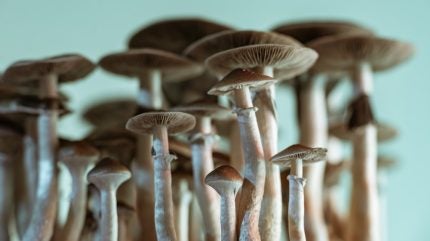
A new study published in the British Medical Journal found potential in the use of psilocybin to treat depression, with the greatest improvements seen in older patients, those with secondary depression and patients who had previously used psychedelics.
Psilocybin is a naturally occurring psychedelic, which binds to serotonin receptors in the brain to change mood, cognition and perceptions. It is the active ingredient in over 200 species of so-called ‘magic’ mushrooms.
The substance is currently classified as a Schedule One drug in the UK, but medicinal uses are being considered for the treatment of mental health problems. There are several psychedelic substances being trialled for the treatment of mental health, but psilocybin is the only drug in Phase III for the treatment of treatment-resistant depressive disorder (P-TRD) in the US.
The study
Psilocybin is forecast to become the fourth highest-selling psychedelic drug by 2029, according to GlobalData’s recent Psychedelics Therapeutics Development and Trends (2024) report. It has been considered to have potential in the treatment of depression because it acts on the serotonin receptors, resetting the brain’s activity patterns.
Eleni Tokali, drugs intelligence analyst at GlobalData and author of the above report, explains: “This ‘reset’ effect, observed in neuroimaging studies, suggests a restructuring across different regions of the brain which underpins not only its rapid but also its sustained effect after the effects of the drug have worn off.”
To assess the effectiveness of psilocybin as a treatment for depression, researchers examined previous randomised controlled trials, comparing the use of psilocybin as a treatment for symptoms of depression with controls. They identified seven relevant trials with a total of 436 participants, with controls including placebo, niacin (vitamin B), or microdoses of psychedelics.
Access the most comprehensive Company Profiles on the market, powered by GlobalData. Save hours of research. Gain competitive edge.

Your download email will arrive shortly
We are confident about the unique quality of our Company Profiles. However, we want you to make the most beneficial decision for your business, so we offer a free sample that you can download by submitting the below form
By GlobalData
Researchers measured changes in depression using the Hedge’s g statistical tool, considering a score of 0.8 to represent a large effect, 0.5 a moderate effect and 0.2 a small effect.
Psilocybin treatments averaged a Hedge’s g score of 1.64, with the study finding that its use elicited a significant change in depression scores in comparison with other treatments.
Further analyses found that greater improvements were found in those with secondary depression, those who were assessed using a self-reported scale, patients who were older and those who had previously used psychedelics.
However, the high levels of variation between trials led the study authors to note that there was not yet strong evidence to support a strong antidepressant effect of psilocybin. They also acknowledged that the lack of participant diversity (90% were white) was a limitation of the findings.
They concluded that the results “support a prudent approach in both scholarly and public settings, because more and better evidence is needed before any clinical recommendation can be made about therapeutic use of psilocybin.”
Will psilocybin be used to treat depression?
Characterised by an imbalance in brain chemicals that regulate mood, depression is the leading cause of disability, thought to affect around 300 million people globally. Its prevalence has increased by almost 20% in the past decade, but current antidepressant drugs take between four and seven weeks to have an impact, and remission of symptoms can take months.
The study’s authors explain that “psilocybin’s mechanism of action differs from that of classic selective serotonin reuptake inhibitors (SSRIs) and might improve the treatment response rate, decrease time to improvement of symptoms, and prevent relapse post-remission.”
However, there are still many obstacles between successful clinical trials and the broad introduction of the treatment. These include cost, the lack of regulatory guidelines and legal safeguards and considerations of environment – in clinical trials, patients receive psilocybin in a calm space with music, and the supervision of a psychotherapist. This would be difficult to achieve on a greater scale within a healthcare system.
Yet Tokali sees reason to be optimistic, explaining: “I consider the science and use of psilocybin to be very exciting as it will provide, in combination with psychotherapy, relief for mental health issues to people who haven’t responded to conventional therapy, but it is still a preliminary area that we need to pay attention to … As we consider the potential legalisation of psilocybin, it’s crucial to maintain a balance between excitement and scientific rigour, prioritising patient safety throughout this transformative journey.”
She points to a recent shift in the perceived potential of psilocybin to treat depression, noting that psilocybin was designated a ‘Breakthrough Therapy’ by the FDA in 2018 for treatment-resistant depression.
Sales of psilocybin are expected to grow at a CAGR of 265.1% between 2026 and 2029, according to GlobalData, with global sales forecast to reach $765m. The US will dominate this market and will account for an expected 65% of total sales in 2029.

Sign up for our daily news round-up!
Give your business an edge with our leading industry insights.
